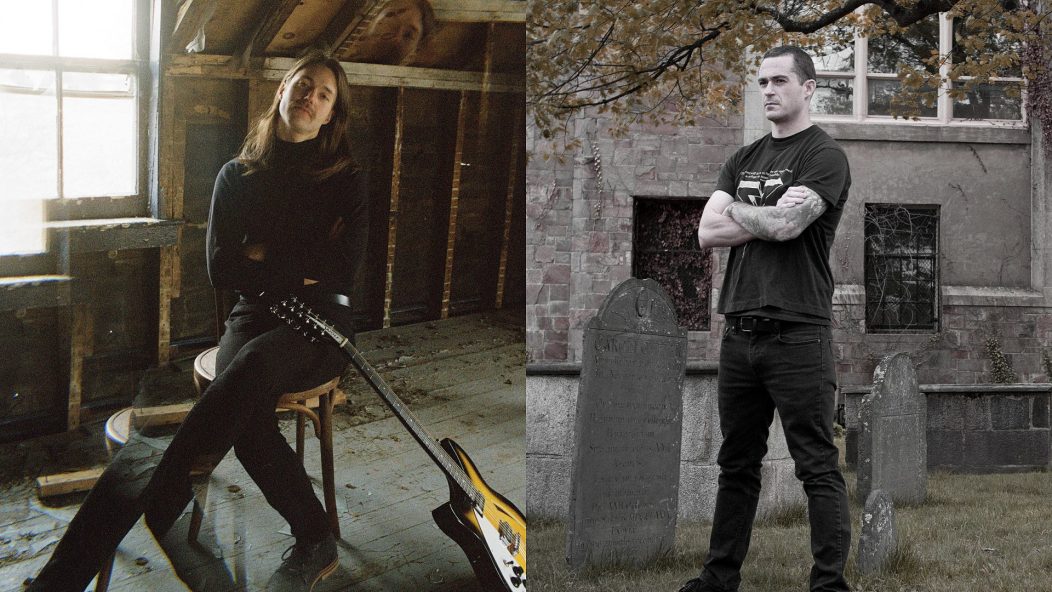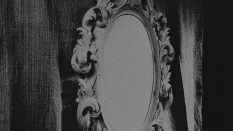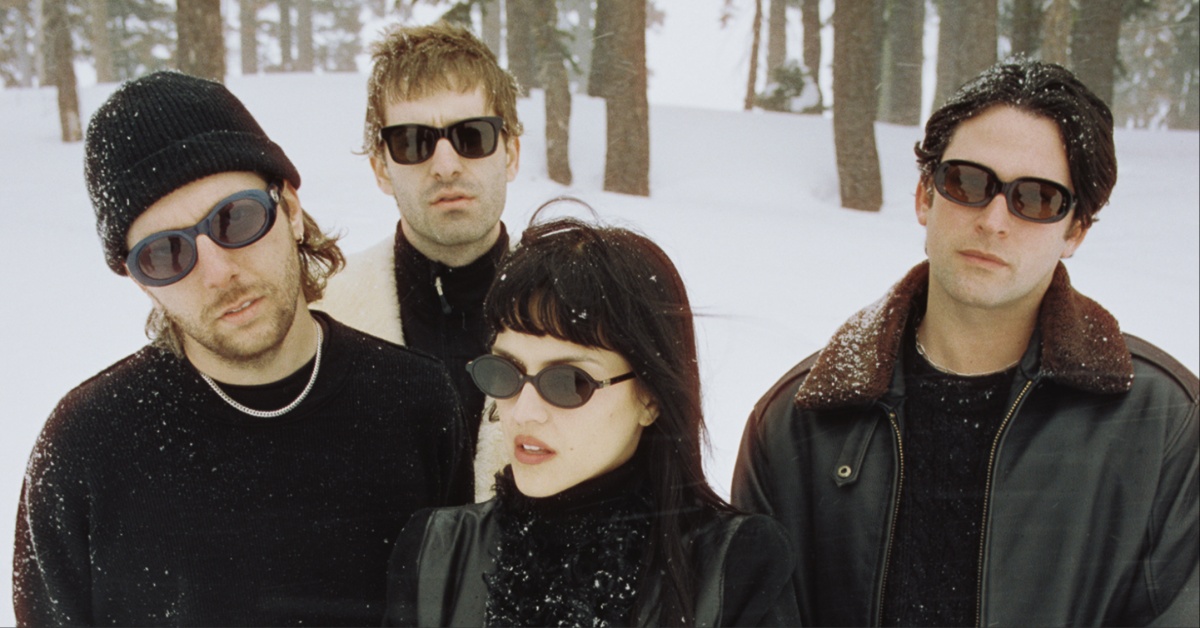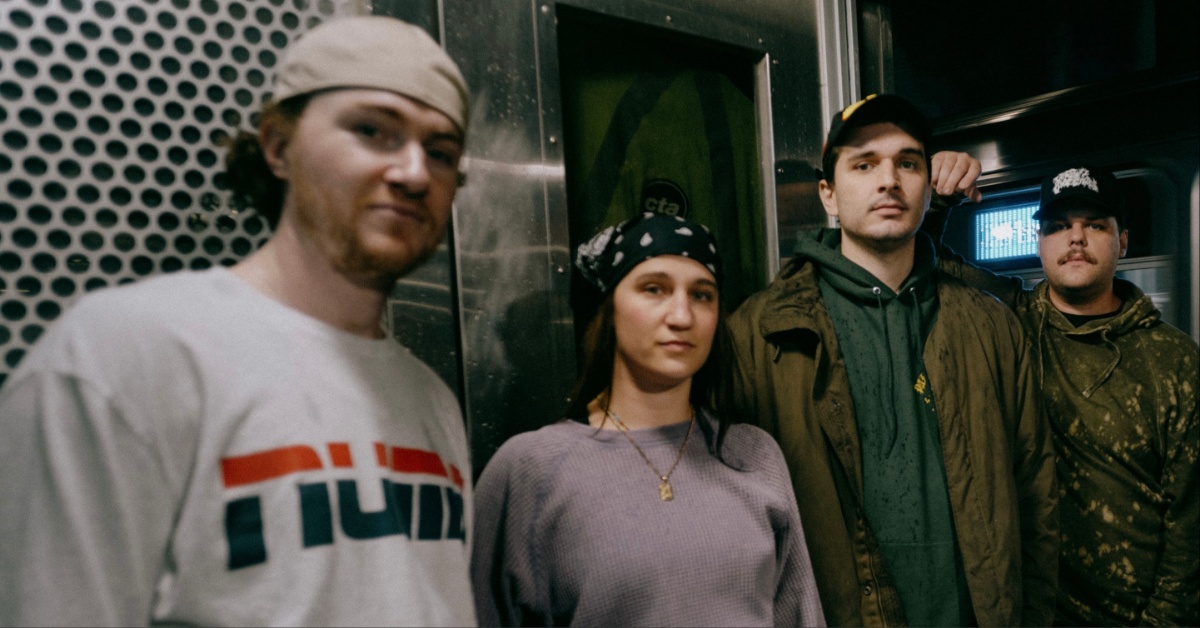
The Soul is a Wave: A Conversation with Dream Unending (Interview)
Life is hard. You grow up, you work, you die. It’s a really negative experience: this strange, capitalized form of existence, but what if it wasn’t that way? What if we could break free from modern life’s constraints and stage a philosophical revolt, celebrating life instead of resigning to it. International duo Dream Unending, featuring Tomb Mold’s Derrick Vella and Innumerable Forms’ (among others) Justin De Tore find solace in life’s endless fantasy.
Set against a death/doom metal backdrop (a classic one, at that, the band citing Anathema and the rest of the Peaceville Three as primary musical influences), Dream Unending’s concentration on life isn’t necessarily an expected one. A revolutionary in his own right, De Tore’s life-affirming lyrics carry a similar weight to his predecessors. Concentrating on life’s cyclical aspects and the soul’s resilience in the face of adversity, De Tore’s recognizable growl — though heavily reverbed — calls for a deeper emotional connection with music, one which goes beyond superficial nihility and enraptures the listener with relatability and emotions which go beyond the sophomoric.
Vella, who handles all string instruments, crafts dreamlike, crushing atmospheres which both exalt the band’s primary influences, but also twists them with a sense of personality and craftsmanship. Calling the band “dream doom” instead of death/doom metal or doomdeath or what have you, Vella’s songwriting balances on a precipice which hangs over an ocean of heaviness and beneath heavenly light.
Dream Unending’s skyward doom is a conundrum. Downtrodden music which celebrates life? Heaviness which embraces dreamy, almost darkwave atmospheres? On paper, it doesn’t necessarily make sense, and yet Vella and De Tore’s efforts tread new ground here, and the band’s debut full-length album Tide Turns Eternal (a title which references a particularly powerful lyric: “the soul is a wave and the tide turns eternal”) embraces this paradoxical existence. In a lengthy interview, both Derrick Vella and Justin De Tore reflect on Tide Turns Eternal‘s unique existence, in which they celebrate life, revel in atmosphere, and discuss influence.
…
…
Though people generally know you from the death metal world in Tomb Mold, Outer Heaven, and Innumerable Forms, Dream Unending looks to a different sphere of influence in the “Peaceville” school of gothic and death/doom metal. What is your relationship with and history like with this type of music which would lead to such a tribute?
Derrick Vella: My first exposure to Peaceville was Paradise Lost. I had heard Shades of God through an old goth blog in the 2000s. To be honest, I didn’t like it. Through that I learned they had an album called Gothic… I never understood why said blog didn’t upload that one instead. That one got its hooks in me easily. It was such a logical extension from things I was listening to at the time (darkwave and post punk as well as extreme metal). Definite worlds colliding moment. I used to take this bus home at nights that had stretches of pitch black, so mixing that album in with “Filigree and Shadow,” it didn’t seem like a far leap. Lots of memories attached to those albums. From there, I had friends into some doom metal but more of the bell-bottom shit, not so much the cargo pant doom. I was fortunate enough to get put on to groups like Thergothon and Esoteric, though. Esoteric might be the greatest metal band to ever exist. It resonated a lot. The first Unholy album as well. I eventually circled back to listening to more Peaceville stuff. The one that really struck more than the others was Anathema though. They always felt the most heart wrenching. Powerful, epic stuff. Doom is an interesting genre because there’s so much you can do with it. It can be oddly progressive, it lends itself to building atmosphere easily, you can fill in space with so much simplicity to create something dense. I love it as much as I love death metal, if not more so. Dream Unending only exists because Justin asked me to start a band. I hadn’t considered or even attempted writing any doom metal before that point. People always comment on my ability to write so much at a respectable quality level, but I only really do it if I’m asked to. It creates a sink or swim scenario, and I guess I thrive under the pressure of writing for others.
Justin De Tore: I first heard Paradise Lost when Draconian Times came out. It was on regular rotation on college radio up here in Boston. I didn’t hear their earlier work until Nick Orlando from Evoken/Funebrarum recommended that I check out their first few records. I was 21 and hearing Gothic was a most profound experience. Essentially, Nick was the person that got me into death/doom and he’s thanked on the record because of it.
I love the Peaceville Three, but my favorite is most likely Anathema. I have never heard anyone express pain and sadness the way Darren White could. Very inspiring. Anyway, It was always a dream to play this style, but I just didn’t have the right musician friends to do it, so I consider myself blessed to have found someone like Derrick who was as enthusiastic as I was.
Aside from the “sink or swim” philosophy, what is your approach when crafting doom metal and how does it differ from the aforementioned death metal world?
Derrick: I feel like I can write without so much of a safety net with doom as opposed to death metal. Justin gives me a lot of freedom to write how I feel and add lots of layers to it. I never worry about being too melodic, I never dwell on riffs for too long and if I do, Justin lets me know. Or he’ll say “reconsider this riff” and he’s almost always right. When writing the entirety of the Tide Turns Eternal LP there was never any real conflict. One section we cut in half during his tracking process and I didn’t even think twice. I think the intro of “Adorned in Lies,” early on Justin was hesitant about it but instead of scrapping it we brought it to life with the 12 string strums and solidifying the minor root note that drones beneath it. I knew I was in the zone by the time we had reached the long middle section of “Dream Unending” . That was the point where I realized what I really wanted this band to be. Equal parts pretty, unsettling, but always a weight to each section. The nice thing about starting a new band from scratch is there are no real expectations. We can play what we want and not care what anyone thinks. It takes a lot of pressure off. Despite Justin and I being somewhat well known names (let’s be real, Justin is the star), we both don’t really care who likes it or not.
Justin: I’ll leave this one to Derrick… but I demand you omit the part about me “being the star,” [laughs]. That’s an OBVIOUS lie!
Despite wearing your influences on your sleeves to a certain degree, Dream Unending shies away from the traditional “death/doom metal” tag in favor of a self-imbued genre. What led to the “dream doom” term and how did you set out to achieve it?
Derrick: I think it was just a bit at first because of the band name, the fact that the album name came to me in a dream, and we were thinking of dreamy sounding bands like Cocteau Twins, Disintegration-era The Cure, This Mortal Coil while fleshing out the songs. Even some of the inspiration for songs or artwork ideas came from dream sequences from movies (you guys like “Kagemusha”?). Some of that stuff gets branded as “dream pop”, so I guess we’re “dream doom”. There’s also an eye roll factor to it. You’re either in or you’re out. I like that. Depends on how much of a coward you are.
When it comes to both embracing heavy influence as well as this forward-thinking “dream doom” aspect of your music, how do you maintain a balance?
Justin: From the start we wanted to do something different and creative. Derrick may have mentioned this earlier, but we were both pretty open minded coming into this project. I think we both agreed that this would be a doom record, but pretty much everything else was on the table. We were pretty deliberate about it. Most of the bands I do are firmly rooted in a specific style, which is cool too, so it’s been a lot of fun making a record where even I’m occasionally thrown for a loop.
Derrick: The straw that really stirs the drink is that Justin and I are just music nerds. I think we’ve become less concerned with heaviness and more focused on making memorable music that evokes something. Some of the “heaviest” parts come in the clean passages. I think the balancing act comes in more of the form of asking ourselves “is there weight to this.” We try our best to make sure every part of every song has conviction and that we’ve left no stone unturned. And when we need to, we can lean on some outside forces to help further that conviction. Justin having an open mind and believing in me really helps. It gives me the confidence to keep pushing myself.
Going back to the Anathema influence Justin referenced — with referencing this source material, how true did you want your death/doom side to be to the Pentecost III and Serenades era? Was there any way you wanted to change it?
Derrick: I really love some of those slow dreary passages that you can hear on both of those records. Good use of non traditional power chords. And songs like “We, the Gods.” That is basically the blueprint for the title song “Tide Turns Eternal.” But we make it our own by keeping a tight control on the pace. We never wanted the album to break character or be aggressively jarring. Even when the album turns it up in intensity, the pacing never throws you off… if that makes sense
Justin: We never wanted to xerox copy any one particular band. I don’t think we do. As far as vocals go, I would love to invoke a similar intensity as Darren White, but that’s a tall order. We are two different people, and I have to be me at the end of the day. Overall, I think I stayed true to myself both lyrically and sonically on this record.
This type of music is generally seen more as English or European as far as location is concerned. As [North, sorry Derrick] American entrants into the greater hall of gothic death/doom metal, did you feel you had to fill any shoes?
Derrick: Dawg, I’m Canadian, and I don’t play meandering war metal and I’m not Gorguts so I have no shoes to fill because no one cares. Kind of awesome.
Justin: Not at all. We have Evoken, so we are in good company.
Why do you feel this general “gloomy” style, aside from a few standouts (the aforementioned Evoken, Asunder, Thorns of the Carrion, and so on), is so much more prevalent in the European scene than over on this side of the Atlantic?
Justin: Interesting question. I’ve pondered this myself. I’ve always been drawn to the genre but I only have a few friends who share that interest. I’ve gotten to see a lot of the prominent bands play intimate shows here in the states which is cool. Makes the whole thing feel pretty special in a way… But yeah, it’s just not an American thing.
Derrick: I don’t know why more people don’t like the genre or rather, why doesn’t every doom fan I know worship the first couple Ahab records? Is it an aesthetic thing? Those albums are infinitely richer than a lot of US death/doom, but I guess the sea and whales aren’t kvlt enough for people in leather jackets or something. Maybe it’s a label thing. Just an example.
The music (doom) itself requires a patience of sorts. It felt like drone doom or bell bottom doom had much more of an impact on North Americans I know. Maybe most people just don’t want to feel depressed when they’re listening to metal.
I don’t think dream unending is depressing, we have more in common with Cynic than we do Asunder. It is what it is, y’know?
Justin: Derrick made a great point. I think aesthetics are so important to people (image is everything, right?) and the sub genres that aren’t hyper stylized aren’t embraced like the ones that are.
With each of you in a different country, how do you find yourselves sharing the Dream Unending workload? Does songwriting fall on one person or do you find yourselves collaborating?
Derrick: Regarding the workload, Dream Unending essentially operates like this: every couple of weeks I punish Justin with revised demos of songs until we think I’ve hit the sweet spot for each song and then from there we talk about subject matter, maybe I pitch him some stuff and he builds it up from there. Justin writes all of the lyrics he sings, anything else you hear said or sung is written by me.
What is the unending dream to which the band name alludes?
For me, it refers to the journey that we all share, which is life. It alludes to the soul inside each of us that outlives us and maybe it’s eternal. It’s a way to re-align ourselves and our place in the world. I’m not above anyone and neither are you or Justin etc. We’re all the same, flesh and blood, vessels that carry something bigger than we can comprehend. I live the same dream you live.
Something like that! Seems to tie in well with the music which helps.
That’s a pretty cool answer. I was honestly expecting “death,” which made me hesitate asking that in the first place, so hearing the opposite really makes me glad I did. With this concentration on life and existence, how do you feel about pairing it with this sort of slow, often morose music?
Derrick: I think the clean break in the song “Dream Unending” is a great foil to the slow morose stuff. The album definitely sounds dark at times, it’s beautifully melancholic (like a Douglas Sirk movie), there’s conflict, but the clean break is so pretty, and the words of affirmation that we got Richard Poe to speak throws you for a bit of a loop. It’s life affirming, not negative, and the lyrical content shifts in a more hopeful direction for the rest of the album. Justin’s lyrics are sublime. Just so fucking good. I hope listeners read them.
I think we consciously used to clean spoken and sung parts to deliver a message of sorts, maybe just to ourselves and anyone who opens themselves up to it. I wrote those parts and it was nice of Justin to let me contribute. I think we both just see each day as an opportunity to better ourselves and keep moving on. “The soul is a wave and the tide turns eternal,” Y’know? I guess we choose to heal and not dwell. Or at least try.
There’s also a quote from Khalil Gibran in the liner notes about the soul. So some people may read it and feel like they got duped into buying a Christian album [laughs].
After such lengthy discographies which have more negative themes (horror, chaos, et cetera), what was it like to shift to something more life-affirming and positive?
Justin: It’s been a release. I’ve never written nihilistic lyrics, but at this point in my life I’m just tired of the negativity. I find it cowardly to revel in it. I mean it when I say that to write something hopeful has been good for the mind. We didn’t compromise anger or intensity for the sake of creating something optimistic either. These lyrics are just as real as anything I’ve ever written.
Derrick: It was something I’ve wanted to do since around the time Tomb Mold released their last record. I just didn’t have the right platform to express it. The more I got to know Justin and realized the similar wavelength we were on, it just made sense. I don’t want to say anything we did was reactionary to what others do, but we definitely were out on any spooky gloom death shit, we were definitely out on the wrath of god shit, or any of that pessimism. This was just a better path for us to take, it was truer to us. Maybe not the most palatable path for your average metal fan, but I don’t really care :).
What have you learned while wandering down this new path?
Justin: I learned that Derrick is an even more incredible musician than I originally thought.
He pushed me to take risks and to venture out of my comfort zone, both musically and aesthetically, so I have to thank him for that.
Derrick: Justin’s belief in me was a real driving force. I learned that I enjoyed the amount of control and freedom I was given. When it’s on you to record all of the guitars, it gives you lots of room to be creative but you only have to hold yourself accountable. The stress level is a lot lower. I didn’t know I needed this project in my life as much as I did. I think a lot of themes explored in the lyrics and music ring very true to me. As someone who doubts himself and holds himself in low regard, I needed something to give myself a boost of confidence and to take some of my thoughts and place them into a larger context. Maybe a couple listeners will connect with the album in a profound way, like I have.
Ideally, what would you want the listener to connect with or take away from Tide Turns Eternal?
Derrick: Something along the lines of: not to lose hope, that you’re not alone, to persevere, life is worth living and it keeps moving and it’s best to move with it, don’t dwell on the past, love will save you if God can’t. Y’know, standard “don’t lose sight of what’s important” kind of stuff.
Justin: Of course, I would love for someone to connect with the lyrics, but if people just dig the music that’s totally cool too, haha.
…
Tide Turns Eternal releases tomorrow on 20 Buck Spin.











